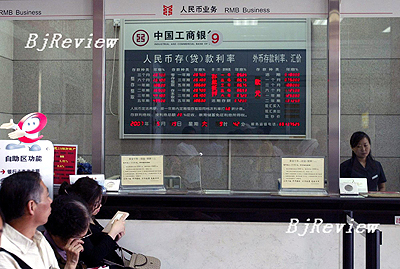
The Chinese central bank has never acted so aggressively, yet its forceful undertakings have had little impact on the surging stock market.
On May 18, the People's Bank of China, the central bank, declared that it would take three separate actions: raise the deposit and loan interest rates, pushing the benchmark one-year deposit interest rate up 0.27 percent; restrict banks' lending ability by raising the reserve requirement ratio up 0.5 percent to 11.5 percent; and allow the renminbi (RMB) exchange rate to float at a wider range-plus or minus 0.5 percent.
Those monetary policies were an effort "to strengthen the central bank's management of liquidity in the banking system, lead to a reasonable increase of lending and investment, and keep the consumer price index at a stable level,'' according to the central bank.
Of all the markets involved, the impact this would have on the stock market was probably the greatest concern for the Chinese people, who have long held the belief that putting their savings into banks was the proper thing to do. Though that may be changing.
To deposit or not?
Currently, China is undergoing negative interest rates. After the latest rate adjustment, the benchmark one-year interest rate has been raised to 3.06 percent, subject to a 20-percent tax on interest. This means a one-year deposit of 10,000 yuan would earn out 245 yuan after deducting the interest tax. However, the consumer price index (CPI) has hovered at over 3 percent the entire year so far, and is widely expected to remain high through the rest of it. This means that the 10,000 yuan would actually lose 300 yuan a year later, figuring in consumer prices.
Guo Tianyong, banking professor at the Central University of Finance and Economics, said it is actually a "good sign that the citizens' deposits shrunk." Guo pointed out that this means the Chinese people have more investment channels instead of simply earning interest off their savings deposits.
A year ago, experts and government officials were worrying about the continuous and substantial increase of deposits, fearing less investment and consumption. Ironically, worries over declining deposits are calling the shots these days.
It is a common practice for Chinese citizens to save money in banks. But now, lured by the prosperous stock market, many are hoping theirs will be a "getting rich overnight" story.
Wu Xiangyang, a well-off 35-year-old interior designer, hasn't felt much of a change since the package of polices were adopted. "I've been saving money in the bank for the past 10 years, most of which is in a current account and doesn't generate any profit," said Wu. After calculating risks and potential gains, Wu decided to open an account and start to trade stocks on May 22. For Wu, the central bank's effort was in vain.
"I don't want to be left alone in this big feast," Wu explained. "I had to take actions so that my savings won't depreciate after years of increases in the cost of living and commodity prices."
Many others hold the same opinion as Wu, believing the bullish run will continue at least into next year, after the Beijing Olympic Games.
"We don't think there is going to be major financial crisis before the 2008 Olympics," Wu said. "If it does happen, who can afford to or be in the mood to go watch the games live in Beijing?"
Wu is a typical example of the restless Chinese individual stock traders. His belief is shared by many. Stock mania will likely continue, braving the regulatory measures enacted to cool the market.
Defying central bank's efforts
Chinese stock holders have already grasped the essence of how to dance with wolves-the interest rate hike. Raising interest rates was meant to bring money into the banks. However, that theory isn't working with the Chinese stock market. As the following chart shows, the benchmark Shanghai Composite Index (SCI) rose on the first trading day after each rate hike (either deposit or loan, or both) over the past year.
The one-two punch of an interest rate hike and a reserve requirement ratio rise don't seem that appealing. As some experts noted, they were too mild to generate a substantial effect.
"The package of policies is a masterpiece of symbolism," contended Tao Dong, Chief Economist of Credit Suisse First Boston.
The stock market has defied the central bank's concerns and continues soaring to record highs since the actions were taken. "It is a clear mockery of the central bank's statement of ‘having confidence, ability and resolution' to handle financial problems," argued Tao.
| 